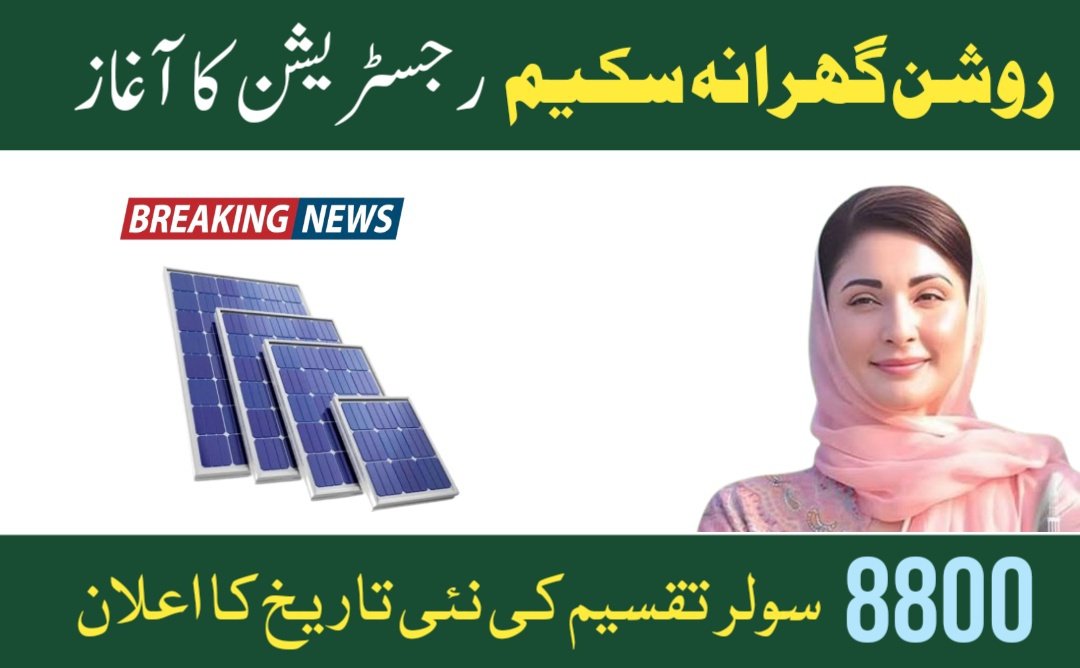Energy crises are major impediments to the progress of any state or province. Punjab, Pakistan’s second most populated province, has a considerable need for energy resources. The province is more urbanized, with 40.7% of the inhabitants living in cities. This metropolitan population generates a substantial demand for power, notably in the industrial and utility sectors. The Chief Minister of Punjab, Mariam Nawaz Sharif, has created the Roshan Gharana Scheme to solve these issues by supplying solar panels to families, lessening the pressure on the electrical grid.
The Energy Crisis in Punjab
Punjab has been experiencing significant energy shortages since the 1970s. In the early years, electricity consumption fell 32% short of supply demand. This difference has grown over time, impeding the province’s economic progress. Frequent blackouts, particularly in the industrial sector, have caused major economic losses and slowed growth.
Urbanization and Energy Demand
The growing urbanization of Punjab has increased electricity demand. As more people relocate to cities, the strain on existing electrical infrastructure increases. Urban regions require more energy for household, commercial, and industrial use. This high demand frequently results in power outages, which disrupt residents’ daily lives and reduce company productivity.
Roshan Gharana Scheme Registration Through 8800 Code 2024

The first 450,000 families in Pakistan will receive solar panels on an easy installment plan, categorized based on their usage. To apply, users must send their electricity bill reference number and ID card number to 8800. After registration, solar panels will be installed, and selected families will pay 25% of the initial cost to the government through the National Bank of Pakistan and Bank of Punjab, with no interest charged. Payments will be made through their electricity bill over a 5-year payment plan. The installation process will occur in September and October.
Impact on the Industrial Sector
The industrial sector in Punjab is an important part of the province’s economy. However, frequent power outages have caused significant disruptions in industrial activities. Factories and businesses rely largely on a continuous power supply to keep manufacturing going. Blackouts cause downtime, higher operational expenses, and revenue losses, all of which hamper economic growth.
Chief Minister’s Initiative: Roshan Gharana Scheme
Recognizing the gravity of the energy problem, Chief Minister Mariam Nawaz Sharif has taken strong measures. She launched the Roshan Gharana Scheme, which provides solar energy panels to families across Punjab. This program seeks to lessen reliance on the traditional electrical grid and alleviate the load of energy generation.
Objectives of the Roshan Gharana Scheme
- Promote Renewable Energy: By encouraging the use of solar panels, the scheme aims to promote renewable energy sources, which are more sustainable and environmentally friendly.
- Reduce Energy Deficits: Providing solar panels to households can significantly reduce the overall electricity demand on the grid, helping to bridge the gap between supply and demand.
- Economic Benefits: With more reliable energy sources, industries can operate more efficiently, leading to economic growth and stability in the region.
- Improved Quality of Life: Families with access to solar energy can enjoy uninterrupted power, enhancing their quality of life and reducing the stress associated with frequent blackouts.
Implementation and Impact
The Roshan Gharana Scheme includes giving solar panels to Punjab families. These panels will use solar energy to generate a reliable and renewable power supply. The initiative is expected to have a substantial positive impact on both urban and rural communities.
Benefits for Urban Areas
The Roshan Gharana Scheme would help to relieve congestion on the metropolitan electrical system. More households adopting solar energy will result in fewer power disruptions, allowing companies and industries to run smoothly. This stability can spur economic activity and employment development.
Benefits for Rural Areas
The Roshan Gharana Scheme has the potential to improve rural communities with inadequate access to power. Solar panels can provide a consistent source of energy, thereby increasing the quality of life for rural communities. This can result in improved educational outcomes, healthcare services, and general living conditions.
Challenges and Solutions
While the Roshan Gharana Scheme offers many potential advantages, it also confronts some problems. These include the initial expense of solar panels, the need for ongoing maintenance, and public awareness and acceptability.
Addressing the Initial Cost
The government intends to subsidize the cost of solar panels, making them more affordable for families. In addition, financial support programs and incentives will be offered to encourage more homes to use solar energy.
Maintenance and Support
To ensure the scheme’s long-term viability, the government plans to build maintenance and support centers. These centers will offer technical assistance and support to homeowners, ensuring that the solar panels remain operational and effective.
Public Awareness Campaigns
Raising public knowledge about the advantages of solar energy is critical. The government plans to conduct educational programs to enlighten individuals about the benefits of utilizing solar panels, such as financial savings, environmental benefits, and increased energy reliability.
Conclusion
The Roshan Gharana Scheme represents an important step toward resolving Punjab’s energy dilemma. By encouraging the use of solar energy, the project hopes to alleviate the strain on the existing electrical infrastructure, increase economic stability, and improve people’s quality of life. While there are hurdles, the government’s commitment to subsidies, maintenance support, and public awareness efforts can help the scheme succeed. As Punjab strives for a more sustainable energy future, the Roshan Gharana Scheme serves as a beacon of hope and development.
FAQs
1. What is the Roshan Gharana Scheme?
Mariam Nawaz Sharif, the Chief Minister of Punjab, launched the Roshan Gharana Scheme to distribute solar energy panels to homes in Punjab. The goal is to lessen reliance on traditional electricity sources and address the energy issue.
2. How will the Roshan Gharana Scheme benefit urban areas?
In metropolitan regions, the initiative will relieve strain on the electricity infrastructure, resulting in fewer power outages and a more stable energy supply. This can boost economic activity while also improving citizens’ quality of life.
3. What are the challenges faced by the Roshan Gharana Scheme?
The primary hurdles are the initial cost of solar panels, the requirement for maintenance, and public awareness. The government intends to solve these issues through subsidies, maintenance support centers, and instructional initiatives.
4. How can rural areas benefit from the Roshan Gharana Scheme?
In remote locations, the project can provide a consistent source of energy, thereby improving living circumstances, educational outcomes, and healthcare access. Solar panels can improve the quality of life for rural residents by supplying reliable power.

